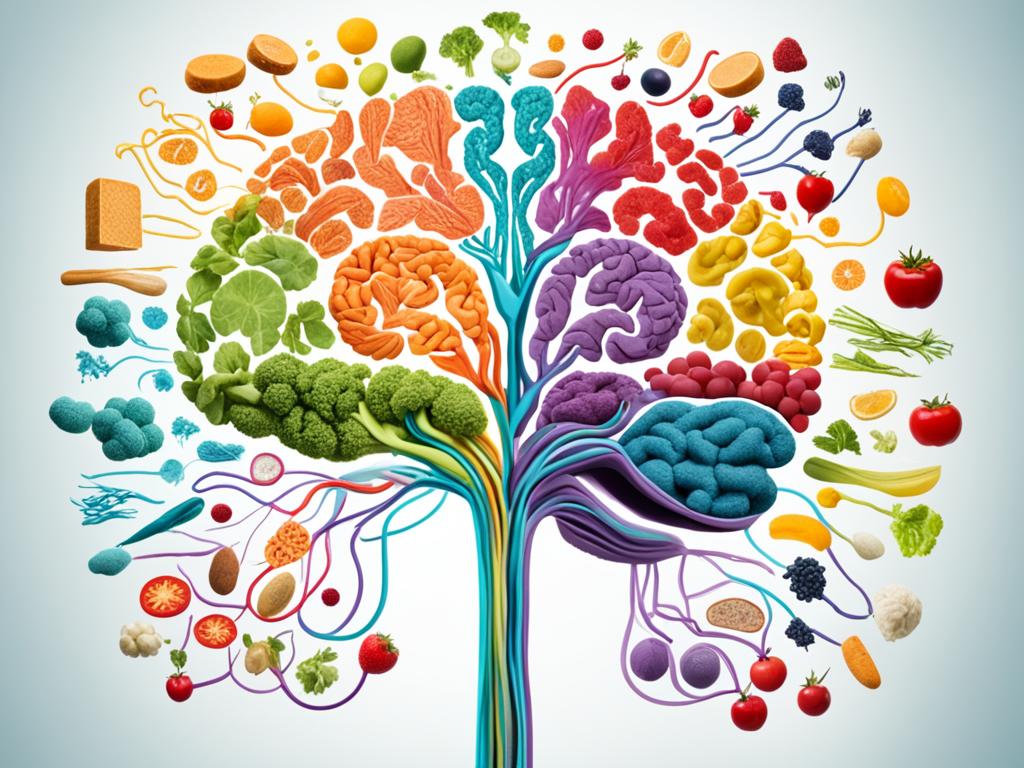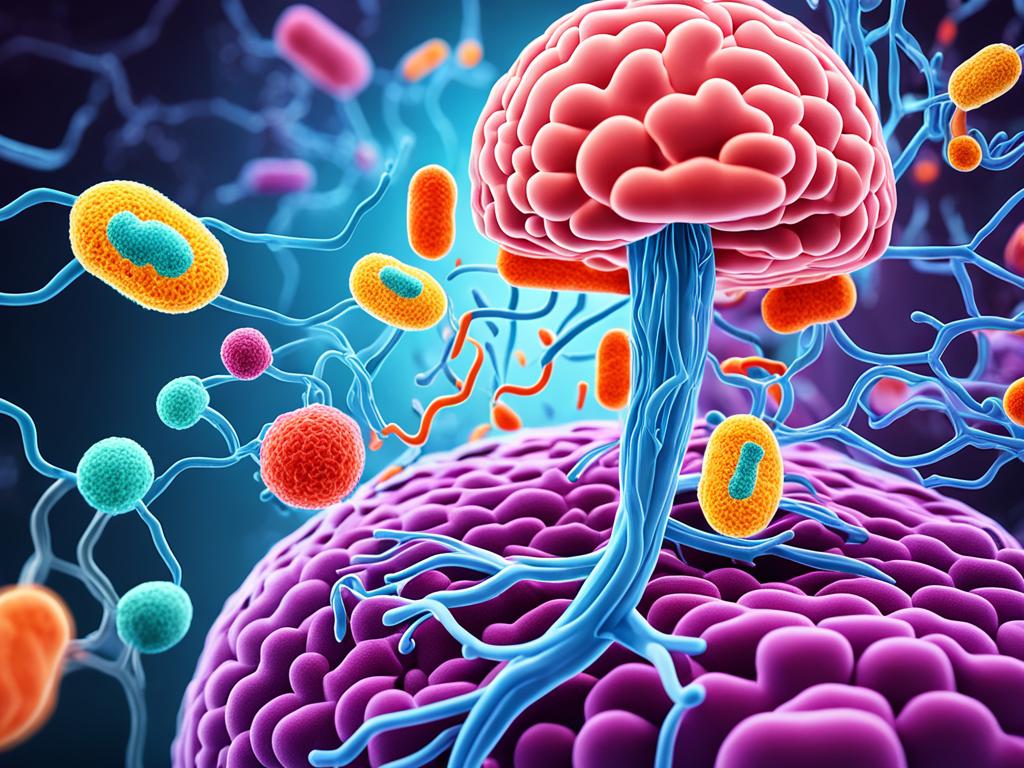I’ve always been intrigued by how our diet affects our well-being. Lately, I’ve focused on the link between food and our minds. It’s amazing how what we eat can truly shape our emotions and thoughts.
This piece dives into how what we eat influences our mental state. We look at the key roles of food on our feelings, its effect on mental health, and the gut-brain link. Understanding these areas can help us make choices that keep mental health issues at bay.
Key Takeaways
- The surprising connections between nutrition and mental health highlight the profound impact of dietary choices on emotional well-being and cognitive function.
- The mind-body connection is a complex and intricate relationship, with nutrition playing a crucial role in supporting brain health and influencing the gut-brain axis.
- Micronutrients, such as omega-3 fatty acids, B vitamins, and antioxidants, are essential for maintaining optimal mental health and preventing mental health disorders.
- The gut microbiome has a significant influence on mood, cognition, and overall mental well-being, underscoring the importance of gut health in supporting mental health.
- Integrative approaches that combine nutrition-based interventions with other therapeutic modalities can provide a comprehensive solution for maintaining and improving mental health.
The Mind-Body Connection
The mind and body are closely linked, showing us how what we eat affects our minds. The mind-body connection proves that our diet influences our thoughts, feelings, and general mental health.
Understanding the Role of Nutrition in Brain Function
The brain needs the right nutrients to work well. How nutrition affects brain function is a major research topic. Foods can change the structure, chemistry, and health of our brain. Omega-3s, B vitamins, and antioxidants help our brain work right, improve mood, and help nerve cells talk to each other.
Gut-Brain Axis: The Influence of Gut Health on Mental Well-being
Recent studies reveal the gut-brain axis and its big role in our mental health. The gut has trillions of tiny organisms that talk to our brain. This affects our mood and thinking. These microbes can make brain chemicals, control inflammation, and talk directly to our nervous system.
Learning about the connections between the gut, what we eat, and the brain helps us take better care of our mental health. We can make smarter choices for a healthier mind by changing our lifestyle.
L’impact de l’alimentation sur la santé mentale: Les liens surprenants
Cet article va parler des liens étonnants entre ce que l’on mange et notre santé mentale. On va voir comment ce qu’on choisit de manger peut grandement influencer notre bien-être émotionnel et notre fonctionnement cérébral. En fait, ce n’est pas évident pour tout le monde, mais notre alimentation joue un grand rôle dans notre santé mentale. Il existe des connexions inattendues entre nos habitudes alimentaires et notre humeur, notre pensée et notre équilibre en général.
L’alimentation ne fournit plus seulement de l’énergie et des nutriments. Elle est aussi un outil pour améliorer notre bien-être mental. Certains aliments aident à produire des substances du cerveau qui nous font du bien. Ils diminuent l’inflammation et changent notre intestin, qui est lié de près à notre cerveau. Savoir cela nous pousse à choisir nos aliments pour prévenir ou gérer les problèmes de santé mentale.
En lisant, vous découvrirez comment ce que vous mangez influence votre bien-être émotionnel et votre fonctionnement cérébral au quotidien. Vous verrez notamment comment exploiter ces connexions inattendues entre nourriture et santé mentale. Cela vous aidera à mener une vie plus saine et plus équilibrée.

Nutritional Deficiencies and Mental Health Risks
Staying mentally healthy is key to being happy. Studies show that not getting enough nutrients can lead to mental issues. This section looks at how your diet affects your mind, highlighting important nutrients for your brain.
Identifying Essential Nutrients for Brain Health
A balanced diet is important for thinking clearly, managing moods, and staying strong mentally. Key nutrients include omega-3s, B vitamins, and antioxidants. Omega-3s boost brain signaling, fight swelling, and make you happier. B vitamins help your brain make energy, nerves, and other important parts. Antioxidants, in foods like berries and veggies, defend your brain from damage and keep your mind sharp as you age.
Consequences of Nutrient Deficiencies on Mental Functioning
Not getting enough of these vital nutrients can seriously affect your mood and how well you think. Low levels of these nutrients raise the chances of mood problems, Alzheimer’s, and depression. For instance, low omega-3s may lead to more depression. If your B vitamin intake is low, you might have trouble remembering things or even experience hallucinations. Antioxidants are essential too; without them, the damage from stress on your brain could happen more quickly.
If you lack these important nutrients, it’s time to step up and take care of your brain. Eating foods rich in these nutrients and using supplements can be a smart move for mental health. This approach could keep mental disorders at bay.
| Nutrient | Function in Brain Health | Deficiency Risks |
|---|---|---|
| Omega-3 Fatty Acids | Support neural communication, reduce inflammation, and enhance mood. | Increased risk of depression, anxiety, and cognitive decline. |
| B Vitamins (Folate, B6, B12) | Play a crucial role in energy production, neurotransmitter synthesis, and neuronal function. | Poor memory, cognitive impairment, and even psychotic symptoms. |
| Antioxidants | Help protect the brain from oxidative stress and support healthy cognitive aging. | Accelerated cognitive decline and increased risk of neurodegenerative disorders. |
The Gut Microbiome and Mental Health
New studies show how vital our gut’s tiny residents are for our mental health. This deep connection is called the gut-brain axis. It tells us how the mix of tiny organisms in our gut can change our mood and thinking.
Exploring the Gut-Brain Connection
The gut microbiome is a world of trillions of bacteria and other tiny beings. It’s important for our health in many ways, including mental health. This world is linked to the brain through sophisticated pathways. It can affect how our brain works and the chemicals it makes.
When the gut’s balance is off, it can lead to mental health problems like feeling very sad or worried. By knowing more about this connection, scientists and doctors can find new ways to help us feel better mentally.
Probiotics and Mental Well-being
Probiotics are getting a lot of attention for their possible mental health benefits. These are good bacteria living in our gut. Some types of probiotics seem to help with mood, lower anxiety, and make thinking better.
Probiotics might help by changing the mix of the gut’s tiny beings. This can lower body-wide swelling. It can also help with making chemicals that our brain needs for managing emotions and thoughts.
Eating foods rich in probiotics, like yogurt and pickled vegetables, or taking supplements, could naturally help our mental and gut health. Doing this might improve the two systems’ connection.

Dietary Patterns and Mental Health Disorders
We now know there is a strong link between our diet and mental health. What we eat, the nutrients we get, affects our risk for mental health problems. The combination of nutrients in our meals is key.
The Role of Inflammation in Mental Health
What we eat can change how we feel mentally by affecting inflammation. Eating lots of processed foods, sugary snacks, and bad fats can cause low-grade inflammation. This can make mental health problems worse.
On the other hand, eating food that fights off inflammation can lower the risk of these problems. Think of fruits, veggies, grains, and fish full of omega-3s. This kind of diet helps fight the inflammation that triggers mental issues.
| Dietary Patterns | Impact on Mental Health |
|---|---|
| Pro-inflammatory diet (high in processed foods, refined carbs, unhealthy fats) | Increased risk of mental health disorders, exacerbation of symptoms |
| Anti-inflammatory diet (rich in whole, nutrient-dense foods) | Reduced risk of mental health disorders, potential for symptom management |
By learning how inflammation links to mental health, we see the power of our food choices. Changing our diet can help prevent and manage mental health problems.
Incorporating Mindful Eating Practices
Embracing mindful eating practices can be great for the mind and the body. By cultivating awareness of food choices, people learn a lot about how they eat. They begin to understand the reasons behind their eating habits. This leads to making better, more nutritious choices. In the end, this helps improve mental health.
Cultivating Awareness of Food Choices
Mindful eating means enjoying each bite and truly feeding your body. It’s about noticing the flavors, textures, and aromas of food. People also learn to appreciate where their food comes from. This helps them understand when they’re truly hungry. It makes eating more balanced and natural.
Mindfulness Techniques for Healthier Eating Habits
Adding mindfulness techniques into your day supports better eating. Things like taking deep breaths before you eat help a lot. So does meditation to focus the mind. These small acts help make meal times more meaningful. Also, focusing on chewing well or truly tasting snacks can make a big difference. The goal is to appreciate every meal, leading to healthier eating habits.

By adopting mindful eating, a positive food relationship is built. This is key for good mental health. Learning about food choices and using mindfulness to eat healthier has many benefits. It touches your emotions, thoughts, and physical well-being.
Integrative Approaches to Mental Health
Healthcare experts are looking at the connection between our body and mind more deeply. They are using new methods to manage mental health. One key way is by focusing on how what we eat affects our mood and thinking.
Combining Nutrition and Therapy
Diet and mental health treatments go hand in hand in this new approach. Healthcare providers are mixing what we eat with talking therapy and medicine. This mix helps find and fix any food shortages that could make mental health issues worse. It also tackles ways the body reacts to certain foods. Together, this all helps make mental health treatments work better for the long run.
Lifestyle Modifications for Overall Well-being
Health experts also say what we do every day affects our mental health. They’re talking about eating well, handling stress, being active, and sleeping enough. They want us to make healthy choices to feel better. Doing this can make a big difference in how we face life’s challenges. It can increase our strength and happiness.
Bringing together food, talk sessions, and better life habits is a big step in mental health care. It looks at both the mind and the body. This full approach helps people build a better life and mind wellness. It’s a way to help people truly get better and lead a happy life.
Prevention and Management of Mental Health Issues
The role of what we eat is key in avoiding and dealing with mental health problems. Eating the right foods can help a lot. From feeling down or worried to more severe conditions like Alzheimer’s, what’s on our plate matters.
Dietary Strategies for Specific Mental Health Conditions
Research points to specific food choices for certain mental issues. People dealing with depression might benefit from more omega-3 fatty acids. They can get these from foods like fish, walnuts, and flaxseeds. Omega-3 can lift your spirits and lower depression-linked inflammation.
Handling anxiety might mean eating more probiotic foods. Think yogurt, kefir, and pickled vegetables. The strong link between your gut and brain means a happy tummy can improve anxiety and how well you cope emotionally. Also, colorful fruits and veggies are a good choice. They’re packed with antioxidants that fight anxiety-increasing oxidative stress.
For neurodegenerative diseases like Alzheimer’s, certain nutrients can help protect your brain. Foods rich in B vitamins, vitamin E, and omega-3s are great for your mind. They can slow cognitive decline. Making these foods a regular part of your meals can guard your brain and delay memory loss.




